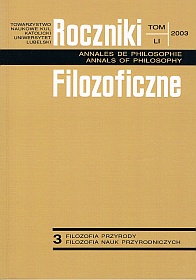An Attempt to Look at Causality in the Characteristics of Mental Events. Does a Theory of the Mind Naturalize?
Abstract
The aim of the paper is to answer the question of how to understand causality in the account of mental events. In my approach, which is many-dimensional, an event plays a role of a cause in the set of causal circumstances (where a cause is treated physically, not conceptually, and is realized in different causal chains).
From my many-dimensional point of view, I propose three groups of definitions for different kinds of determinations: (1) for causal determinations, (2) for causal determinations which are enriched by non-causal ones, and (3) for non-causal determinations.
These definitions should be applicable to diferent kinds of systems, including artificial ones, as well as to various philosophical approaches to the mind. My strategy of inquires seems to be similar to Fodor's taxonomy of research, but in contrary to Fodor, my hierarchy of levels is not only purely structural, but also depends on the place of a given state in the system. My key question is here, whether a description (and explanation) given at the higher level (here: a psychological desciption) is in some way compatible with a description (and explanation) from the lower level (which belongs to neuroscience). My many-dimensional approach, in spite of some objections, should be fruitful because it is able to establish common ground between cognitive scientists and those philosophers who still defend their traditional domains of research and who don't want to allow for its particularization. In this way I try to defend a theory of the mind against the radical naturalization.
References
Damasio A., 2000. Tajemnica świadomości. Jak ciało i emocje współtworzą świadomość. Tł. M. Karpiński. Poznań: Rebis.
Davidson D., (1970) 1992. Zdarzenia mentalne. W: tenże. Eseje o prawdzie, języku i umyśle. Wstęp i tł. B. Stanosz. Warszawa: PWN s. 163-193.
Fodor J., 1994. Fodor Jerry A. W: A Companion to the Philosophy of Mind. Ed. S. Guttenplan. Oxford: B. Blackwell s. 292-300.
Honderich T., (1990) 1998. Mind and Brain: A Theory of Determinism. Vol. 1-2. Oxford: Clarendon Press.
Horgan T., 1993. Nonreductive Materialism and the Explanatory Autonomy of Psychology. W: Naturalism: A Critical Appraisal. Ed. S. Wagner, R. Warner. Notre Dame, Ind.: University of Notre Dame Press s.295-320.
Judycki S., 1995. Umysł a synteza. Argument przeciw naturalistycznym koncepcjom umysłu. Lublin: RW KUL.
Judycki S., 2000. Transkauzalność a determinizm. „Kognitywistyka i Media w Edukacji” t. 3 nr 1/2 s.73-86.
Kim J., 1984. Epiphenomenal and Supervenient Causation. „Midwest Studies in Philosophy” 9, 257-270.
Kim J., (1996) 1998. Mind in a Physical World: An Essay on the Mind-Body Problem and Mental Causation. Cambridge, Mass.: The MIT Press.
Mackie J. L., 1965. Causes and Explanation. „American Philosophical Quarterly” 2, 245-264.
McLaughlin B., 1989. Type Epiphenomenalism, Type Dualism, and Causal Priority of the Physical. „Philosophical Perspectives” 3, 109-135.
Mill J. S., 1962. System logiki dedukcyjnej i indukcyjnej. T. 1-2. Tł. Cz. Znamierowski. Warszawa: PWN.
Mohanty J. M., 1984. Intentionality, Causality and Holism. „Synthese” 61,17-33.
Quine W. V. O., 1986. Epistemologia znaturalizowana. W: tenże. Granice wiedzy iinne eseje filozoficzne. Tł. B. Stanosz. Warszawa: PIW s. 106-125.
Shoemaker S., 1984. Identity, Cause and Mind: Philosophical Essays. Cambridge: Cambridge University Press.
Żegleń U., 2002. Świadomość a problem redukcji. „Roczniki Filozoficzne” t. 50 z. 1 s.597-616.
Żegleń U., 2003. Filozofia umysłu. Dyskusja z naturalistycznymi koncepcjami umysłu. Toruń: Wyd. A.Marszałek.
Copyright (c) 2003 Roczniki Filozoficzne

This work is licensed under a Creative Commons Attribution-NonCommercial-NoDerivatives 4.0 International License.





